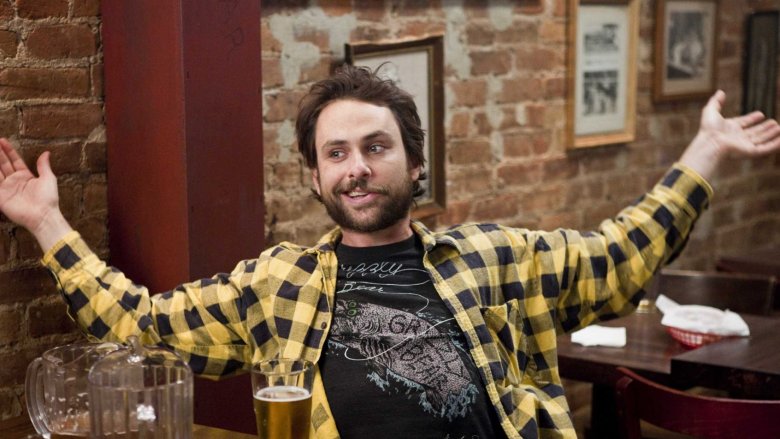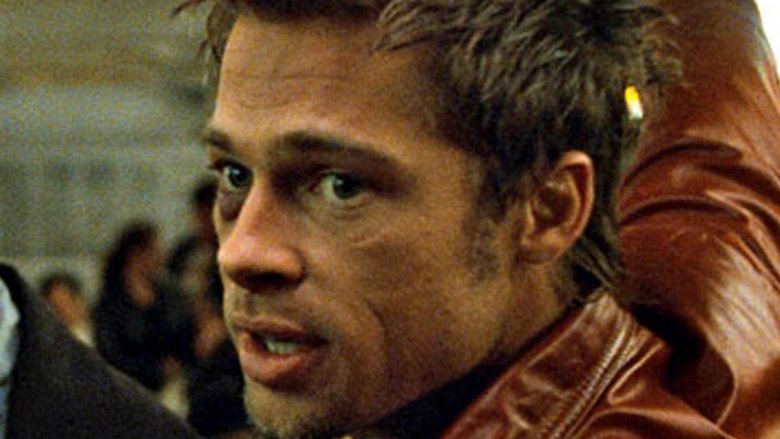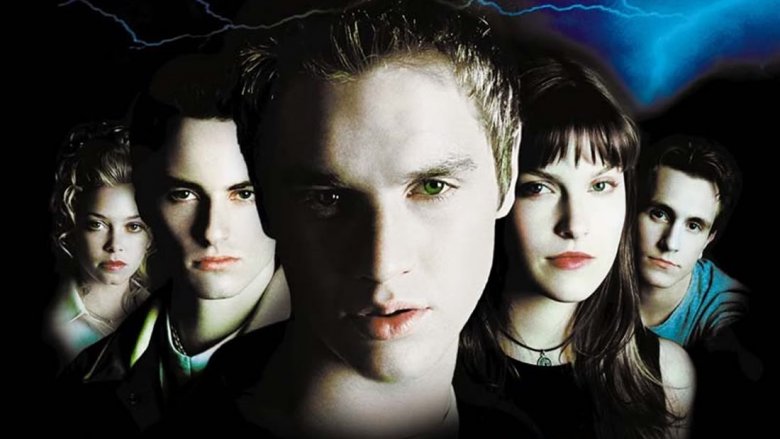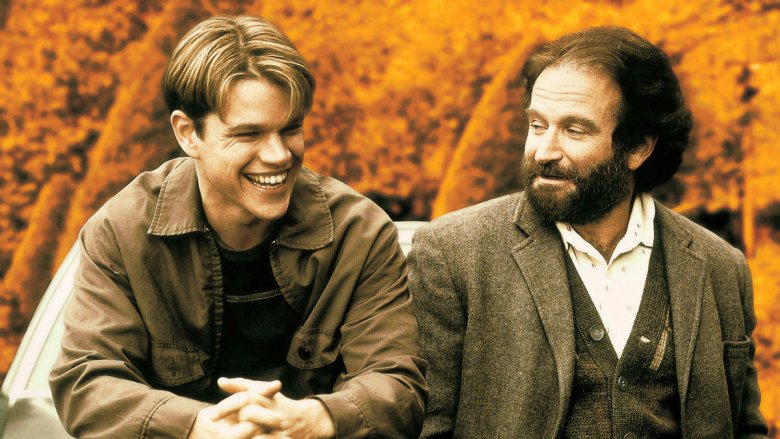Movies & TV Shows Saved By Executives
There are so many legendary stories of studio interference and executive meddling in show business history, you might think the business side of things has no business getting involved with the creative side of things. But this anti-executive bias overlooks a few major examples of executives who actually saved a movie or TV show from being a total disaster, or at the very least helped shape the final product into the version we all know and love. Here are some examples of when the "money guys" got it right ...
Seinfeld
Seinfeld without Elaine? Get out! It almost happened, but was averted following the pilot — dubbed The Seinfeld Chronicles, like Jerry was wielding a broadsword or something — thanks to NBC executives worried the "Show About Nothing" lacked sex appeal for the guys, and didn't feature a relatable female character for the gals. Network bigwigs "emphatically" suggested "a woman on par with George and Kramer," according to Jennifer Keishin Armstrong's Seinfeldia: How a Show About Nothing Changed Everything. Thus, Julia Louis-Dreyfus's hilarious, and iconic, Elaine Benes was born.
That's not the only example of positive executive input in the show's history. Before casting Louis-Dreyfus, the entire show, in fact, was literally saved by network executive Rick Ludwin, who was in charge of late-night programming and specials. Ludwin sensed that the show was unique so, in an unprecedented move, he offered to pay for the show's first four proper episodes out of his totally unrelated department's budget, salvaging the whole project after the "dead pilot" was burned off on a random summer night. Superman's great, Jerry, but clearly not all heroes wear capes.
The Big Sleep
No less a reputable source than the late, great Roger Ebert says that executive input is precisely the reason that 1946's The Big Sleep is the noir classic cinephiles know and love today. "[T]his is a case where 'studio interference' was exactly the right thing," Ebert wrote in his four-star 1997 review of the Howard Hawks-directed masterpiece. Hawks once cracked that a good movie was "three great scenes and no bad scenes," and Ebert argues that the studio neatly [proved] his point."
Here's the story: Humphrey Bogart and Lauren Bacall's sizzling chemistry was given more screen time thanks to studio head Jack Warner, who insisted on re-shoots at the urging of Bacall's agent, Charles Feldman, who was concerned about the state of his 20-year-old client's burgeoning career. Feldman and Warner agreed the scenes between Bacall and Bogey needed more "insolence" from Bacall, and more double entendre-driven flirting and romance between the duo, who married in real life after the film's first version—unreleased until the the 1990s—had already wrapped. The result is "one of the great film noirs," according to Ebert, one that fortunately didn't end up with a ridiculous, studio-influenced title like Philip Marlowe's Big Case! or something.
It's Always Sunny in Philadelphia
FX President John Landgraf is to thank for a fan-favorite on It's Always Sunny in Philadelphia. Co-creators Glenn Howerton and Rob McElhenney admitted on Chris Harwick's Nerdist podcast they were "forced" by Landgraf into including a well-known actor heading into Season Two, which they weren't too keen on at first. "[W]e kinda liked that we were no-names and it was this weird, small thing, you know," Howerton said. We don't know exactly how the network responded to the pushback, but we imagine Langraf was like, "Did you say weird and small, Glenn? FX has the guy for you!"
Howerton and McElhenney had nothing to worry about: Danny DeVito's Frank Reynolds might just be the weirdest character on the show, which is saying a lot when you've already got Charlie Kelly slaughtering hundred of rats after his friends get him a Negan-style barbed baseball bat for his birthday. The "deranged, diabolical, and incontinent" Reynolds, to quote Jazmine Hughes in the New York Times, gave the show a shot in the arm, elevating it into a trashy masterpiece. Who but DeVito could pull off being birthed from a sofa, naked and greasy, into a room of aghast partygoers? Chris Farley, maybe, but there's no way he could've fit in that sofa.
Glee
Fox Entertainment president Kevin Reilly is responsible for the late addition of Jane Lynch's beloved Sue Sylvester to FOX's Glee. In his first phone call to co-creator Ryan Murphy, Reilly told Murphy the show needed a villain, which sparked Murphy's imagination. As she told Entertainment Weekly, while recalling the conversation, "[I said] I knew exactly who she is. I said, 'Her name is Sue Sylvester. And she is the cheerleading coach. And she may be on horse estrogen.'"
It's hard to imagine the show without Sue. Fans and critics both adored her — the Los Angeles Times raved that "Lynch alone makes Glee worth watching" and Entertainment Weekly called her "the greatest Broadway-musical villain to ever co-star in a TV series." Lynch's portrayal was so entertaining, she even managed to sell the insane plot twist in the series finale when she became the Vice President of the United States in 2020, paired with re-elected POTUS Jeb Bush, which sounds a lot less unlikely now than it did in 2015.
Conan the Barbarian
In the DVD commentary for 1982's Conan the Barbarian, director John Milius says executives at Universal didn't trust star Arnold Schwarzenegger to voice the opening narration — or any narration, for that matter — because of his famously thick Austrian accent. Akiro the Wizard (Mako Iwamatsu) instead took on the task, and it's a good thing. Can you imagine 1982 Arnold saying lines like "the rise of the sons of Aryas" or "jeweled crown of Aquilonia"? You might as well stick cotton balls in his mouth first, Marlon Brando-style.
The unnamed Universal executives also spared filmgoers from Arnold's narration throughout the entire film. "Arnold was supposed to narrate the whole thing," Milius says in the commentary track, but the studio just didn't have the "confidence" in Arnold to say, well, anything. Producer Dino De Laurentiis, in fact, tried to get Milius to overdub all of Arnold's dialogue, but fortunately lost that battle. As impenetrable as early-'80s Arnold's accent could be, it's better than an entire film of Arnold sounding like he's from Ohio, as 1977's Hercules in New York made hilariously clear.
Fight Club
Not only did Laura Ziskin, president of 20th Century Fox offshoot Fox 2000, purchase the film rights to Chuck Palahniuk's 1996 novel Fight Club and champion David Fincher as director, she also inadvertently inspired one of the film's funniest lines. Ziskin objected to the original line Marla was supposed to deliver after first having sex with Tyler Durden: "I want to have your abortion." She, not terribly shockingly, thought it "crossed the line of good taste" and would "alienate" viewers. That line alone wouldn't have turned Fight Club into a Troma movie, but yeah, it's pretty icky.
Ziskin insisted that Fincher cut the line, and he agreed, on one condition: whatever alternate line he came up with had to go in the movie. Ziskin naïvely thought nothing could top the abortion line, so she told him to write whatever he wanted. Thus, "I haven't been f****d like that since grade school" was born, proving you don't mess with David Fincher. The man fought the studio to put a pregnant woman's head in a box in Se7en, Laura — you should've seen this coming.
Six Feet Under
In 1999, HBO CEO Chris Albrecht and President Carolyn Strauss helped inspire Six Feet Under to become one of the network's stone-cold classics, with the kind of feedback most showrunners probably dream about: "We really like [the pilot script], but we have a main note for the whole thing: It feels kind of safe. Could you make it more f****d up?" How cool is that?
Creator Alan Ball said he was happy to make the characters "messier and weirder," leading to moments like Claire stealing a human foot, Billy being, um, Billy, and Nate accidentally getting high on ecstasy during a family dinner — not to mention his big "narm" moment. The "Gay Cop Paintball" episode, however, might have been taking things too far. Maybe you should have reeled that goofiness in just a tad, HBO.
Final Destination
Executives at New Line Cinema relied heavily on test screenings to determine the ultimate fate of Final Destination, basically letting a few dozen members of the film's target demographic reshape the film, as the above DVD featurette reveals. In this case, the execs made the right call — first, they scrapped the weak original title, Flight 180, which made the flick sound like a throwback to the airport thrillers Airplane! was spoofing in the '70s. Also, they did away with the contemplative, sappy ending with Carter, Clear, Clear and Alex's baby, and an unconvincing CGI leaf at the cemetery. (Was the feather from Forrest Gump busy?)
The reshoot cost $2 million, but it was worth it: the film went on to be a huge success, spawning approximately eleventybillionteen sequels, and test audiences reportedly jumped to their feet and cheered the new ending, where Carter was crushed to death by a sign. But that might have just been Devon Sawa backlash—you can only see someone come of age so many times before you start rooting for the Reaper.
Good Will Hunting
If it wasn't for Castle Rock President Rob Reiner (yes, that Rob Reiner), 1997's Good Will Hunting might have been a spy thriller/comedy. Seriously: Ben Affleck and Matt Damon's original script "had a very Beverly Hills Cop, Midnight Run sensibility, where the kids from Boston were giving the NSA the slip all the time," according to Affleck.
Reiner, however, told them they actually had two movies in one, fighting each other: that "kids from Southie thwarting the big government agency" movie, and an "awesome character story about this math genius and his relationship with this shrink" movie. Reiner urged them to pick between the two — they chose wisely, which ultimately resulted in the film we all know and love.
Yes, Meathead from All in the Family saved Good Will Hunting. How do you like them apples?
Anchorman
Studio-ordered reshoots are to thank for one of the most quotable, meme-friendly films of the 2000s ending up as great as it did. The original script of Anchorman: The Legend of Ron Burgundy featured a group of political revolutionaries calling themselves The Alarm Clock, a parody on the real-life group The Weather Underground. The joke, such as it is, was this: The Alarm Clock doesn't have any real goals or unifying message, but they still rob banks and even kidnap Ron Burgundy's rival-turned-love interest Veronica Corningstone to help get "the truth" out to the world, even though they don't know what "the truth" is. Are you laughing out loud yet?
To be fair, a few of the deleted scenes—cobbled together into an odd straight-to-DVD "lost movie" called Wake Up, Ron Burgundy—are actually pretty funny, including a great bit featuring Amy Poehler as an uncooperative bank teller critical of the group's rubber masks. But the studio-requested overhaul was ultimately for the best, trimming about a dozen characters from an already jam-packed movie, including Chuck D of Public Enemy as a character named "Malcolm Y." Woof. Let's just say, occasional funny scene or not, your excitement for this little curiosity de-escalates quickly.



